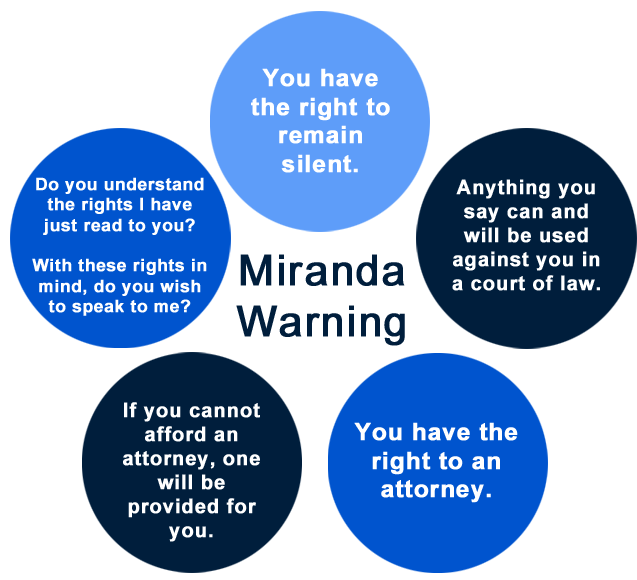
Miranda Rights in Georgia – Not Read Your Miranda Rights, Self-Incrimination, and Pleading the Fifth
What You Need to Know About Your Miranda Rights in Georgia
Under the Fifth Amendment to the United States Constitution, you have the right to refuse questioning or to make any statement that might incriminate yourself. You’ve no doubt heard of someone “pleading the fifth,” which means they are invoking their constitutional safeguards against self-incrimination. If you have been detained or are subject to police questioning in the state of Georgia, it is very important that you know your rights under the law.

What is Self-Incrimination?
Anything you say to police can be used to secure a conviction against you in court. When you make a statement to provide information to law enforcement that may harm your defense, this is considered self-incrimination. This can happen directly by you making a statement during interrogation or indirectly by simply letting information slip voluntarily. Either one will hurt you in court.
How Are These Rights Protected?
As a way of ensuring you have been informed of your rights, law enforcement is required to read you your Miranda rights at any time you are in custody or being subjected to questioning. You do not need to have been formally arrested to be read your Miranda rights.
• You Have the Right to Remain Silent
This is at the heart of what the fifth amendment protects. Under the constitution, you can refuse to answer any questions or provide any statements. You cannot be punished for keeping silent, and you cannot be compelled to incriminate yourself. That said, police have many tactics for getting around this right and convincing you to talk. It’s important to know that you are under no obligation to speak.
• Anything You Say Can and Will Be Used Against You in a Court of Law
An extension of your right to remain silent, this portion of the Miranda warning makes it clear that any statements you give, no matter how benign, are potential building blocks of the prosecution’s case against you. Whether you are innocent or guilty, securing that conviction is what matters most to law enforcement, and they are not afraid to twist or misconstrue what you say to paint you in the most guilty light.

• You Have the Right to Speak with an Attorney and Have Them Present During Questioning
Even if you are completely innocent of any wrongdoing, it is highly advantageous to have an attorney present whenever speaking with law enforcement. As mentioned, the police will try to twist your words against you. They will do whatever it takes to secure a conviction. An attorney is crucial protection and defense against these tactics.
• If You Cannot Afford an Attorney, One Will be Appointed to Represent You
The judicial system is required to provide any potential defendant with an attorney, generally a public defender. If you can’t afford a private attorney, this is an option. Having someone in your corner with experience is always going to work better in the long run.


What if I Waive my Miranda Rights?
You can, of course, speak to law enforcement of your own free will after you have been Mirandized. You might think that this will be seen as a good-faith gesture on your part, but the police will view it as an opportunity to get you to incriminate yourself. Regardless of your innocence or guilt, it is highly dangerous to speak with law enforcement without invoking your constitutional rights and requesting an attorney.
What if I am Not Read my Miranda Rights?
Your Miranda Rights must be read to you the moment you are in custody, subjected to questioning or are otherwise detained without freedom to leave. It’s important that they read you these rights, but it’s also important for you to know that you have them whether they are read to you or not. If you are detained and have not been Mirandized, remember that your words can be used against you. Failure by law enforcement to read your Miranda rights does not invalidate the arrest, but it does mean that some statements and evidence can potentially be suppressed or left out later in court. Meaning, if police do not follow protocols and producers, it can weaken their case against you and potentially lead to a dismissal of your charges.
How Can the Claiborne Firm Help?
Simply put, we can fight for you. If law enforcement failed to read your Miranda rights or read them improperly, we can work to have your case dismissed outright or reduced. Even if you just believe your constitutional rights were violated or you were otherwise unjustly accused, we can attack the prosecution’s case against you with a tried-and-true strategy that has helped countless clients keep their records clean.
We start by empowering you, guiding you through the process and giving you the knowledge you need to fight the charges against you and get your life back. We then begin digging deep into the particulars of your case, launching our own independent investigation, locating witnesses and sifting through every scrap of evidence against you. This in-depth preparation leaves us better prepared than the prosecution.
And with that preparation, we expose the many cracks and procedural mistakes made by law enforcement and prosecution. With the flimsiness of their case exposed, we press our advantage and work to get your record cleared and your innocence validated.
Speaking with one of our seasoned attorneys is the first step. Submit your contact information below or call (912) 351-8775 to schedule a free, no-obligation evaluation of your case, and then let us start fighting for you.
Call (912) 351-8775 or Schedule a Free Case Evaluation Online





